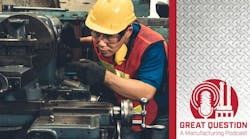Luke Clark is a reliability professional and senior program manager for HECO Apollo. In his current position, Luke identifies reliability value for clients by utilizing vibration analysis and IoT technology. Luke recently spoke with Plant Services editor in chief Thomas Wilk about how the skillset for reliability and maintenance engineers has changed over the past 10 years. In addition, the two discussed the table stakes skills necessary for current professionals to succeed in their jobs.
Below is an excerpt from the podcast:
PS: The first topic I want to talk about Luke is the way that the core skill sets of the average plant millwright specifically have changed over the past 10 or so years. And to narrow it down, we're talking really mechanical millwrights versus electrical (I know electrical is very much its own thing). But you've seen a lot of change in industry, you come into contact with a wide variety of customers. What kind of changes have you seen in the expectations of that kind of skill set for the average plant millwright?
LC: I think a lot of it revolves around technology, what we've seen for the average millwright, the average maintenance technician, whatever title you want to want to say, is that it's shifted away from simply being expected to be able to be mechanical, to understand the equipment that you're working on, but also to be part of the greater system. I think all of us have dealt with that, no matter what role it is, where right now we're having a conversation on Microsoft Teams.
I think what we've seen is just that expectation that you're not just the maintenance tech that goes out and works on equipment and gets the equipment up and running, and then you go back to the office and wait for the next call, or the next work order. Now it's, we have technology, we have data, we have our CMMS, we have IoT devices. That's all part of our ecosystem, and we have to make decisions based off of it, we have to know how to use that technology. We now have to know how to look at the data and understand and actually make decisions around it. That expectation from our millwrights is that you're able to utilize that technology in some way, shape, or form.
That's changed over the years, and I think the biggest change that has had is, in the past we would see a millwright or a technician be in a role and be in that same role for 10, 20, 30 years. What I think I've seen change in the workforce in that regard is upward mobility. Now they're more involved with decision making, more involved with the technologies, and the ones that really shine in those categories and move up, all of a sudden they have managerial expectations. We've seen a lot of movement, and I think that's been one of our challenges for keeping people in roles is that we make people promotable by that. We actually make their skill sets more varied, and they're not expected to just be someone that's mechanical; they're expected to have a wide skill set, so people tend to move on.
PS: Interesting, there's a couple of follow ups I want to ask about that answer you just gave, which is a really terrific analysis of what's going on out there. The first one would be, would you characterize this change as being specifically on the journeyman level, with a with a certain level of experience? or would this apply to apprentices too, that things can change quickly and that people have to have that whole-system awareness?
LC: I would say both. At this point, a lot of the journeyman integrate with technology, but for them, they tend to be the ones that have that mechanical experience, so they're the ones that stay in that role. I think that the biggest challenge has been the entry level, because right off the bat we're teaching them technology, and so they learn the full business outside of just the mechanical aspects. Look at it this way, you get an entry level employee, you train them on the technologies, the processes, they're very involved with meetings, taking planning and scheduling meetings, and so on, and they're very involved with the business side of what you do. Then also you teach them the mechanical side, and then you look down the road 5-10 years later, and all sudden, they're a very valuable asset to your company, or they're very valuable to another company, and then they get poached or they get into managerial roles, so it's hard to keep someone in that millwright role for as long as we used to. So I think the change we've seen is at the entry level for the most part, because they're very different employees than what we did 20-30 years ago.
PS: I appreciate the answer, and I'm curious to know, you mentioned promotability as one of the factors these days. Would you say that promotability is linked primarily to years of experience in the job, or experience on specific assets? Do certifications come into play where say someone eventually earns a CMRP or a CRL, or an MLT or a vibration level one and two, and that's the way forward?
LC: It’s a combination of those things. It certainly helps when you can get the certifications, you can show the progress that you've made. However, I think oftentimes it's the role that you play, and a specific tool, right? So, in the CMMS world, we see oftentimes where someone was very crucial to CMMS implementation, and they became a key member of an implementation or upgrade, or whatever it is, and they were recruited for that, and they showed a lot of potential. Then they gain great experience, and then next thing you know, it's like, wow, this guy is kind of an expert at this. Oftentimes it's when they latch on to a big project and then they shine in that project, and that either gives them opportunity to be promoted internally, or externally they find another job.
But that’s oftentimes where you see them get latched on to these major projects, which speaks to where we are as an industry too, because we have a lot of major corporations as well. That's also changed the game, where we have less small local manufacturers and we have very large corporate structures, so there's more opportunity to be involved with very large projects. So you can say, well, hey, I was part of a $15 million project where we did this, this, and that, and here was my role and so on. You can speak to a much larger level to get yourself more promotable to move on to whatever your goals are. There's opportunities for movement also within just these large companies that were that we're dealing with on a day to day basis.
PS: You're reminding me even on the media side, Luke, we had a guy who was our one of our art designers for the print version of the magazine. And he got into web development to such a degree that now he's a full time web developer for our media company, and that was through contact with the IT and web team for large projects.
LC: Yeah, right time, right place, and there's lots of opportunities to shine. I think there's a lot of opportunities with these large companies, and that happens a lot.
Read the rest of the transcript
About the Podcast
Great Question: A Manufacturing Podcast offers news and information for the people who make, store and move things and those who manage and maintain the facilities where that work gets done. Manufacturers from chemical producers to automakers to machine shops can listen for critical insights into the technologies, economic conditions and best practices that can influence how to best run facilities to reach operational excellence.


